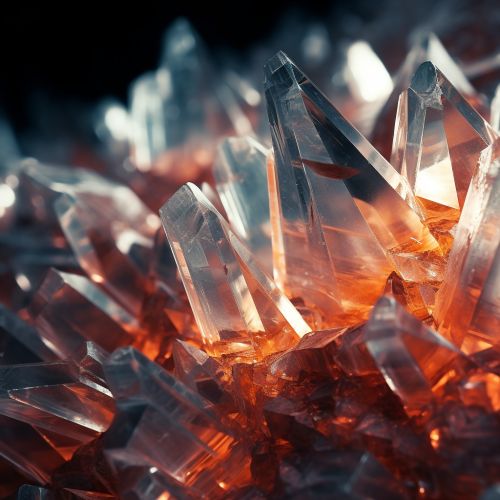Nitrate
Introduction
Nitrates are a type of chemical compound that contain a nitrogen atom bonded to three oxygen atoms. The term is also used for the conjugate base of nitric acid, consisting of one nitrogen atom bonded to three oxygen atoms (NO3−). Nitrates are common components of fertilizers and explosives. They are naturally occurring ions that are part of the nitrogen cycle.
Chemical Properties
Nitrates are characterized by the presence of an N−O bond, an example of a multiple bond. They have a trigonal planar molecular geometry around the central nitrogen atom, with an average bond length of 1.28 Å. The nitrate ion is planar, and each of the bonds is equivalent because the nitrate ion is symmetrical. The nitrate ion carries a formal charge of −1. This results from a combination of the +5 oxidation state of nitrogen and the −2 oxidation state of oxygen.
Production
Nitrates are produced by a number of processes in the environment. The most important primary producers are bacteria in the soil and oceanic phytoplankton. These organisms convert ammonia into nitrite and nitrate, a process known as nitrification. This nitrate can then be used by plants to build amino acids and proteins.


Uses
Nitrates are used in a variety of ways, both industrially and naturally.
Agriculture
In agriculture, nitrates are used as a fertilizer. Plants use nitrates as a source of nitrogen, a nutrient that is essential for growth and development. Nitrates are easily absorbed by plants and can promote rapid growth.
Food Preservation
Nitrates are also used in food preservation. They are used as a preservative in cured meats like ham, bacon, and hot dogs. Nitrates help to prevent the growth of harmful bacteria, enhance the flavor of the meat, and give cured meats their characteristic pink color.
Medicine
In medicine, nitrates are used in the treatment of heart conditions such as angina and congestive heart failure. They work by relaxing and widening blood vessels, which allows more blood to flow to the heart.
Explosives
Nitrates are a key ingredient in many explosives. The most common of these is ammonium nitrate, which is used in a variety of commercial and industrial explosives.
Health and Environmental Effects
While nitrates are essential for plant growth, excessive amounts can cause problems. High levels of nitrates in water can cause nitrate poisoning in humans and animals, a condition known as methemoglobinemia. This condition can cause a variety of symptoms, including shortness of breath, blue baby syndrome in infants, and even death in severe cases.
Excessive use of nitrate fertilizers can also lead to water pollution, as the excess nitrates can leach into groundwater and surface water. This can lead to eutrophication, a process where water bodies become overly enriched with nutrients, leading to excessive growth of plants and algae and the depletion of oxygen in the water.
